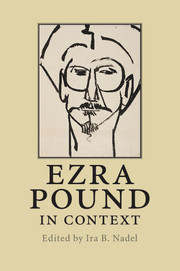Book contents
- Frontmatter
- Contents
- Notes on contributors
- Acknowledgements
- Chronology
- List of abbreviations and note on references to The Cantos
- Introduction
- Part I Biography and works
- 1 Prose criticism
- 2 Poetics
- 3 Translation
- 4 Romance languages
- 5 Letters
- 6 Editor, anthologist
- 7 Education
- 8 Journalism
- 9 Politics
- 10 Economics
- 11 Radio broadcasts
- 12 Law
- 13 Textual criticism
- 14 Archives
- 15 The Lives of Pound
- Part II Historical and cultural context
- Part III Critical reception
- Further reading
- Index
- References
11 - Radio broadcasts
Published online by Cambridge University Press: 05 July 2014
- Frontmatter
- Contents
- Notes on contributors
- Acknowledgements
- Chronology
- List of abbreviations and note on references to The Cantos
- Introduction
- Part I Biography and works
- 1 Prose criticism
- 2 Poetics
- 3 Translation
- 4 Romance languages
- 5 Letters
- 6 Editor, anthologist
- 7 Education
- 8 Journalism
- 9 Politics
- 10 Economics
- 11 Radio broadcasts
- 12 Law
- 13 Textual criticism
- 14 Archives
- 15 The Lives of Pound
- Part II Historical and cultural context
- Part III Critical reception
- Further reading
- Index
- References
Summary
In November 1939, only a few months after Germany invaded Poland, Ezra Pound set forth a propaganda plan for America, sharing it first with Cornelio di Marzio, editor of Meridiano di Roma (a fascist newspaper already publishing Pound's articles), and then with various representatives of the Italian government. The plan concerned a wide-ranging series of publications, but in pressing forward – Pound was politely rebuffed in December, then again more firmly in April – he shifted his emphasis from print to radio. This was not a surprising turn. The disruption of shipping made print an unreliable medium for reaching the USA, and Pound had come to believe (as he told an Italian functionary) that “the absolute predominance of Jews in the North American press…obstructs in an absolute fashion the possibility of making [Italy's] voice heard in the United States.”
Though no great lover of the radio (Pound thought it a “God damn destructive and dispersive devil of an invention” [SL, 342]), he had gained some small experience of the technology in preparing his operas for the BBC, and had developed an appreciation for the medium's political reach in considering the career of Father Coughlin. In 1936, offering The Listener a series of essays on what he would do as “minister of Kulchur in Utopia,” Pound was told by the editor, “If you want to be a Minister…you will have to broadcast” (quoted in EPRO, 196). By May of 1940, he had come to the same conclusion, working out “a lucid rhetorical scheme” for radio propaganda for the United States with numbered points grouped under the headings “scope” and “methods.” Eventually, Pound's perseverance paid off.
- Type
- Chapter
- Information
- Ezra Pound in Context , pp. 115 - 124Publisher: Cambridge University PressPrint publication year: 2010

